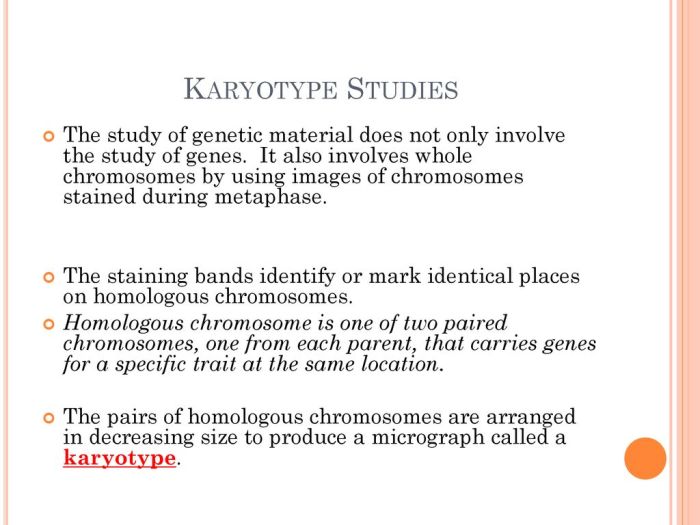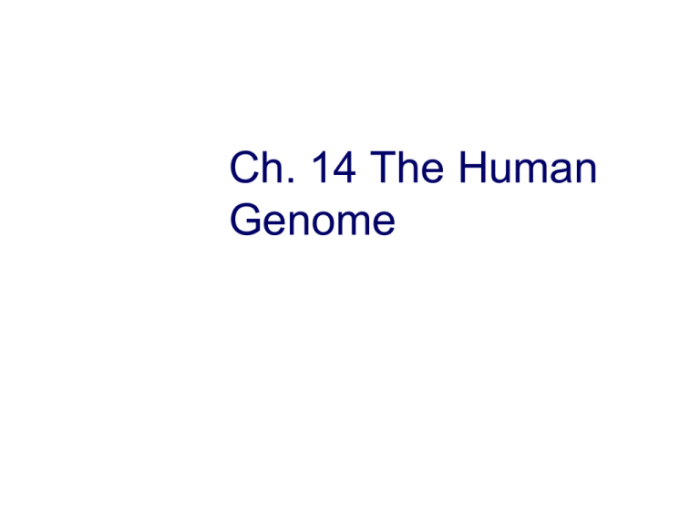Chapter 11 section 3 chromosomes and human heredity – In the realm of genetics, chapter 11 section 3 delves into the fascinating world of chromosomes and human heredity, unveiling the intricate mechanisms that govern the transmission of traits across generations. Chromosomes, the thread-like structures within our cells, hold the blueprints for our genetic makeup, dictating our physical characteristics and predispositions.
This exploration begins with an overview of chromosome structure and function, shedding light on their role as the carriers of DNA and genes. We will then delve into the diverse types of chromosomes, including autosomes and sex chromosomes, and their influence on gender determination and inheritance patterns.
Overview of Chromosomes and Human Heredity: Chapter 11 Section 3 Chromosomes And Human Heredity

Chromosomes are thread-like structures found in the nucleus of cells that carry genetic information. They play a crucial role in heredity, determining the traits that are passed down from parents to offspring.
Each chromosome consists of a long DNA molecule coiled around proteins called histones. DNA contains the genetic code that determines the structure and function of an organism. Genes, which are specific regions of DNA, code for specific proteins that perform various functions in the body.
Types of Chromosomes
There are two main types of chromosomes: autosomes and sex chromosomes.
- Autosomesare chromosomes that are not involved in determining gender. Humans have 22 pairs of autosomes.
- Sex chromosomesare chromosomes that determine gender. Humans have two sex chromosomes, X and Y. Females have two X chromosomes (XX), while males have one X and one Y chromosome (XY).
The sex chromosomes carry genes that are responsible for sex-linked traits, such as the development of male or female reproductive organs.
Chromosome Mutations
Chromosome mutations are changes in the structure or number of chromosomes. They can be caused by errors during cell division or by exposure to environmental factors such as radiation.
There are several types of chromosome mutations, including:
- Deletions: Loss of a portion of a chromosome
- Duplications: Gain of a portion of a chromosome
- Inversions: Reversal of a portion of a chromosome
Chromosome mutations can have a variety of effects on human health, depending on the type of mutation and the genes that are affected.
Genetic Disorders
Genetic disorders are caused by mutations in genes or chromosomes. These disorders can be inherited from parents or can occur spontaneously due to mutations during cell division.
Some common genetic disorders caused by chromosome mutations include:
- Down syndrome: Caused by an extra copy of chromosome 21
- Turner syndrome: Caused by the absence of one X chromosome in females
- Klinefelter syndrome: Caused by an extra X chromosome in males
Genetic disorders can have a wide range of effects on individuals and families, depending on the specific disorder.
Chromosomal Analysis
Chromosomal analysis is a technique used to examine the chromosomes in a cell. This can be done for a variety of reasons, including:
- Diagnosing genetic disorders
- Determining gender
- Investigating infertility
There are several different techniques used for chromosomal analysis, including:
- Karyotyping: A technique that involves staining and banding chromosomes to create a picture of their appearance
- FISH (fluorescence in situ hybridization): A technique that uses fluorescent probes to identify specific chromosomes or genes
Chromosomal analysis is an important tool for diagnosing genetic disorders and understanding the causes of infertility.
Advances in Chromosome Research, Chapter 11 section 3 chromosomes and human heredity
In recent years, there have been significant advances in chromosome research. These advances have led to a better understanding of human heredity and the development of new treatments for genetic disorders.
Some of the most important advances in chromosome research include:
- Gene mapping: The process of identifying the location of genes on chromosomes
- Genome sequencing: The process of determining the complete sequence of DNA in a genome
These advances have made it possible to identify the genes responsible for many genetic disorders and to develop new treatments for these disorders.
FAQ Corner
What is the role of chromosomes in heredity?
Chromosomes carry DNA, which contains the genetic information passed down from parents to offspring.
How do sex chromosomes determine gender?
Females typically have two X chromosomes (XX), while males have one X and one Y chromosome (XY).
What is a chromosome mutation?
A chromosome mutation is a change in the structure or number of chromosomes.
What are some common genetic disorders caused by chromosome mutations?
Down syndrome, Turner syndrome, and Klinefelter syndrome are examples of genetic disorders caused by chromosome mutations.
How is chromosomal analysis used in diagnosing genetic disorders?
Chromosomal analysis techniques, such as karyotyping and FISH, allow doctors to examine chromosomes for abnormalities that may indicate a genetic disorder.

